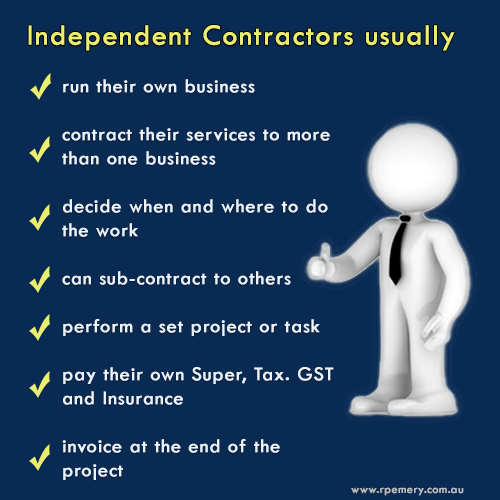Many employers choose to engage an employee as a “contractor” to save the additional costs that can come with hiring permanent or part-time employees.
But is it really your choice?
Whether a worker is an employee or contractor is determined by a number of factors with no one factor necessarily conclusive. As the payer, it’s your obligation to examine all the facts in each case, including the terms of your contract with the worker which should show the intent of both parties.
A key factor in deciding if a worker is an employee is the degree of control that can be exercised over the worker. If you have the right to direct how, when, where and who is to perform the work, the worker is likely to be an employee. These directions may be verbal or in writing, or simply understood between the parties.
Another factor to consider is whether the worker is being paid for the time they work, or being paid for a result. Workers being paid by the hour are more likely to be employees. Workers being paid for a result are more likely to be independent contractors.
Independent contractors typically bear a greater financial risk than employees. They are responsible for covering business expenses, providing their own tools and equipment, and are liable for any mistakes or issues that arise in the course of their work. Additionally, contractors are responsible for their own tax, insurance, and superannuation.
This table outlines the differences between employees and contractors.
| Factor | Employee | Independent Contractor |
|---|---|---|
| Control over work | Employer directs how and when work is done | Contractor decides how and when work is done |
| Payment | Regular wage or salary | Paid per task or project |
| Risk | Low financial risk; covered by employer | Bears the financial risk of their own business |
| Equipment | Employer provides tools and equipment | Provides their own tools and equipment |
| Leave entitlements | Entitled to paid leave (annual, sick, etc.) | No entitlement to paid leave |
| Superannuation | Employer must pay superannuation contributions | Responsible for own superannuation arrangements |

Although independent contractors don’t receive the same benefits as employees, such as paid leave or sick days, they are still protected by Australian law. Contractors must still receive a fair wage for their services and are protected from sham contracting under the Fair Work Act.
If a business penalises you for asserting your rights as a contractor, you may be able to seek legal recourse.
The Australian Taxation Office offers an Employee / Contractor Decision Tool that you can use to help you decide.
Review your Contracts because the ATO are conducting audits
The ATO are now conducting field visits to identify cases where individuals are being incorrectly engaged as contractors. Industries where the ATO have previously observed this occurring include
- call centres,
- transport and logistics,
- retail,
- education,
- aged care,
- health,
- telecommunications
- building and construction sector.
Based on an assessment of all factors, if a worker is an employee, it’s your obligation as the payer to withhold the appropriate amount of tax from any payments made to them.
As an employer you may also have obligations under fringe benefits tax and the superannuation guarantee laws.
If you get it wrong, you may be at risk of the ATO raising PAYG Withholding liabilities to you on the net payments you have made to your workers. In addition, superannuation and fringe benefits tax liabilities may also be raised.
Important Note In some cases the superannuation guarantee laws may apply to payments for work or services by an independent contractor. Should you engage an independent contractor, we suggest you obtain advice in relation to whether you still have a superannuation obligation.
If you’re working as an independent contractor, having a clear written contract is essential. This contract should detail the scope of the work, payment terms, and any responsibilities each party holds. A well-drafted agreement ensures both parties understand their obligations and can help resolve disputes more easily.
RP Emery provide up to date Employment Agreements for all type of employer / employee relationships and Independent Contractor Agreements.
We thank WMS Accountants and the ATO for this information

